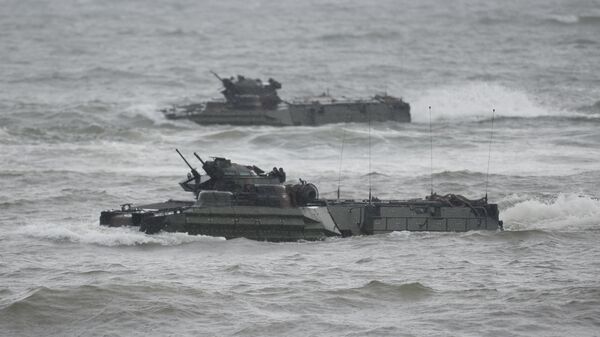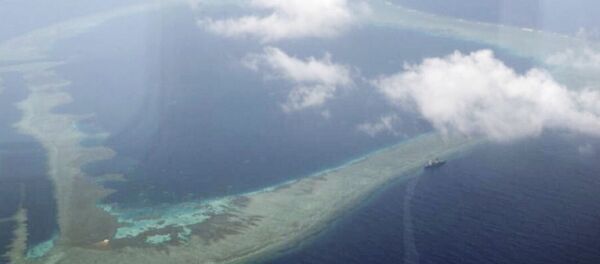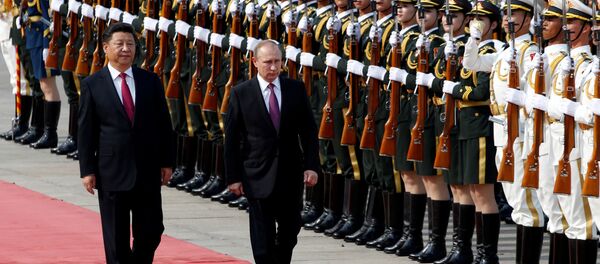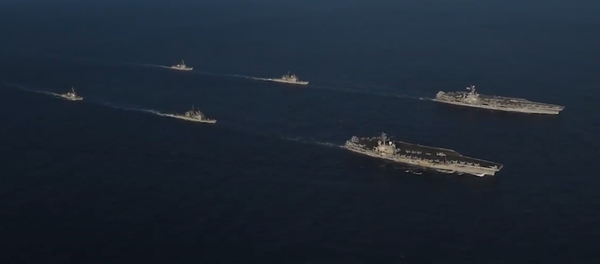The Asia Reassurance Initiative Act of 2018 (ARIA) is aimed at containing China's political, economic and military rise, Jan R. Weinberg, an American peace activist and founder of "Show Up! America", told Sputnik.
"ARIA, which has already been enacted into law, is a blatant and short-sighted continuation along the lines of Obama's Pivot to Asia policies and practices — whose cornerstone strategy was and continues to be US projection-of-power throughout the entire Indo-Asia Pacific, designed specifically to maintain US hegemonic interests while containing a rising China", the activist said.
Although the law "seeks to build a positive, cooperative, and comprehensive relationship with China" it clearly envisages boosting economic, political and security ties with ASEAN and Taiwan.
Specifically, ARIA urges the US president to "conduct regular transfers of defence articles to Taiwan that are tailored to meet the existing and likely future threats from the People's Republic of China".
It also designates India as a "major defence partner" of Washington, "facilitates joint exercises, coordination on defence strategy and policy, military exchanges, and port calls in support of defence cooperation between the United States and India".
Furthermore, the law establishes "the trilateral security cooperation between the United States, South Korea, and Japan, including missile defence, intelligence-sharing, and other defence-related initiatives"; and launches a quadrilateral security dialogue between the United States, Australia, India, and Japan.
Additionally, ARIA reiterates the US commitment to enhanced security partnership with Indonesia, Malaysia, Singapore, and Vietnam and emphasises the necessity of "joint maritime training and freedom of navigation operations in the Indo-Pacific region, including the East China Sea and the South China Sea" — which has long been a bone of contention between Washington and Beijing.
The new law authorises $1.5 billion dollars for each fiscal year between 2019 and 2023 to promote US interests in the Indo-Pacific region.
"I am ashamed of myself and embarrassed to admit, as a peace activist and researcher of government/corporate collusion, that I did not see this coming", Weinberg remarked.
China is Not Going to Sit Idly By
Weinberg considers it paradoxical that Donald Trump is trying to strike a "better trade deal" with China, while at the same time continuing to encircle the People's Republic in the Indo- Asia Pacific region.
He drew attention to the fact that "ARIA was wholeheartedly and foolishly approved of by the entire Senate and House of Representatives without a word of rebuke or dissension at all by any members of Congress".
"Did the collective legislative and executive branch of American government actual believe that China would not react? Did they actually believe that if they added a few words about humanitarian aid that they could obfuscate their belligerence?" Weinberg asked rhetorically.
China has already reacted to the ARIA provision which reaffirms the United States' commitment to selling weapon systems to Taiwan.
At a 2 January forum commemorating the 40th anniversary of issuing the Message to Compatriots in Taiwan, Chinese President Xi underscored that the People's Republic is ready "to create broad space for peaceful reunification, but will leave no room for any form of separatist activities".
"We make no promise to renounce the use of force and reserve the option of taking all necessary means", the Chinese president stressed.
On 5 January, Xi reportedly ordered the country's armed forces to be "battle ready".
"As unaware as the American public is of ARIA, imagine that the United States Congress is not cognizant that their actions have a direct causal link to China's reactions", Weinberg noted.
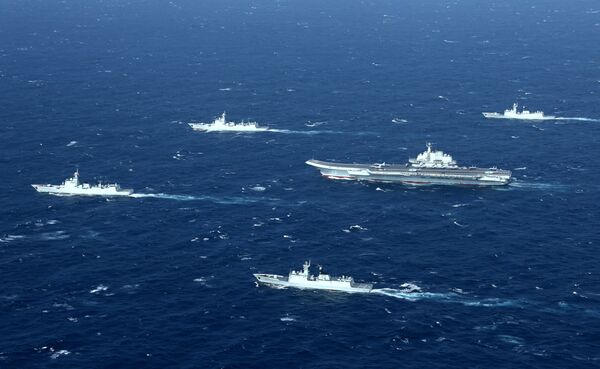
ARIA Fraught With Risk of US Military Action
However, that is not all, according to the peace activist: The law could be used for launching and expanding military operations in the Indo-Pacific region under the pretext of counter-terrorism efforts.
"Thus ARIA authorises the executive branch to utilise funds for Asia Reassurance Initiative Act to 'build new counterterrorism partnership programmes in Southeast Asia to combat the growing presence of ISIS [Daesh*] and other recognised international terrorist organisations that threaten the US'", he said.
"The United States Congress, through ARIA, fails to rescind the Authorisation to Use Military Force (AUMF) or modify the provisions as to prohibit war against terrorists within the sovereign Indo-Asia Pacific nations", he said. "And yet under the Authorisation to Use Military Force (AUMF) the president can, to the neglect of Congress, expand United States military engagements within the Indo-Asia Pacific".
Weinberg highlighted that "considering the presence of terrorists with Asia Pacific nations (which is fairly well-documented) and given that US military forces have already had a 'supporting role' with the Philippine military in the 2017 Battle of Marawi, there is every reason to believe that the US military, directed by the president, under the auspices of the AUMF, will engage in more and more 'unauthorised' wars within the Asia Pacific".
"To say the very least — China is not going to like that!" he added.
South China Sea and the Blue Whale Field
On 13 January 2017, the Vietnamese state-owned company PetroVietnam and ExxonMobil agreed to develop the Blue Whale field (or Ca Voi Xanh), Vietnam's biggest natural gas project, for power generation with an estimated 150 billion cubic metres of reserves.
"The ExxonMobile/Vietnam Blue Whale project began during the Obama administration and being located in disputed territorial waters has been challenged by the Chinese Navy", Weinberg elaborated.
The problem is that the Blue Whale field lies in Block 118, which remains an apple of discord between Hanoi and Beijing. Both countries say that the field lies within their exclusive economic zone (EEZ).
According to the activist, it appears that Washington is going to push ahead with its oil and gas projects in the South China Sea, regardless of Beijing's discontent.
"Is it coincidental that the United States has committed vast resources to expand and maintain its military presence within the Middle East and the Asia Pacific, both of which are regions with vast untapped fossil fuel reserves?" Weinberg asked, dubbing the Trump administration's forthcoming build-up in the Indo-Pacific a Cold War 2.0 against China.
*Daesh (ISIS/ISIL/Islamic State) is a terrorist groups banned in Russia.
The views of the contributors do not necessarily reflect those of Sputnik.

